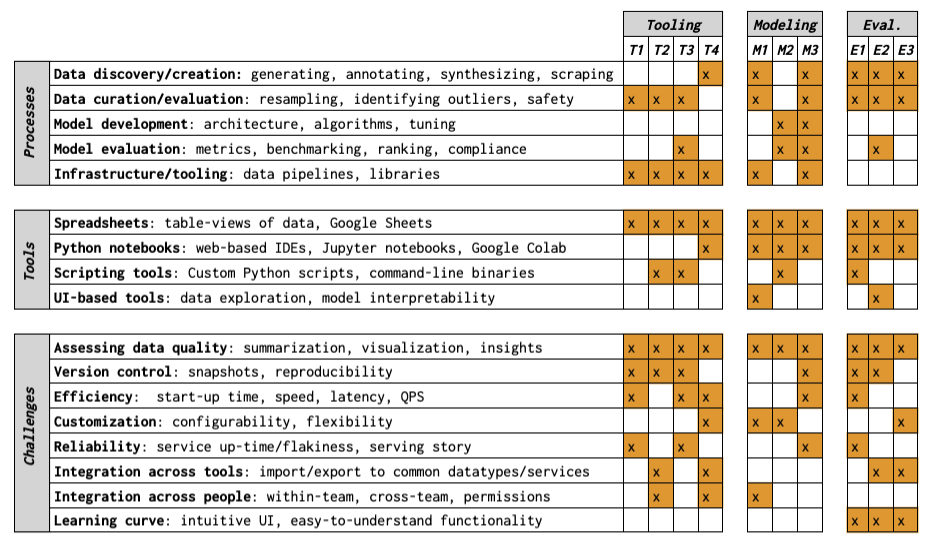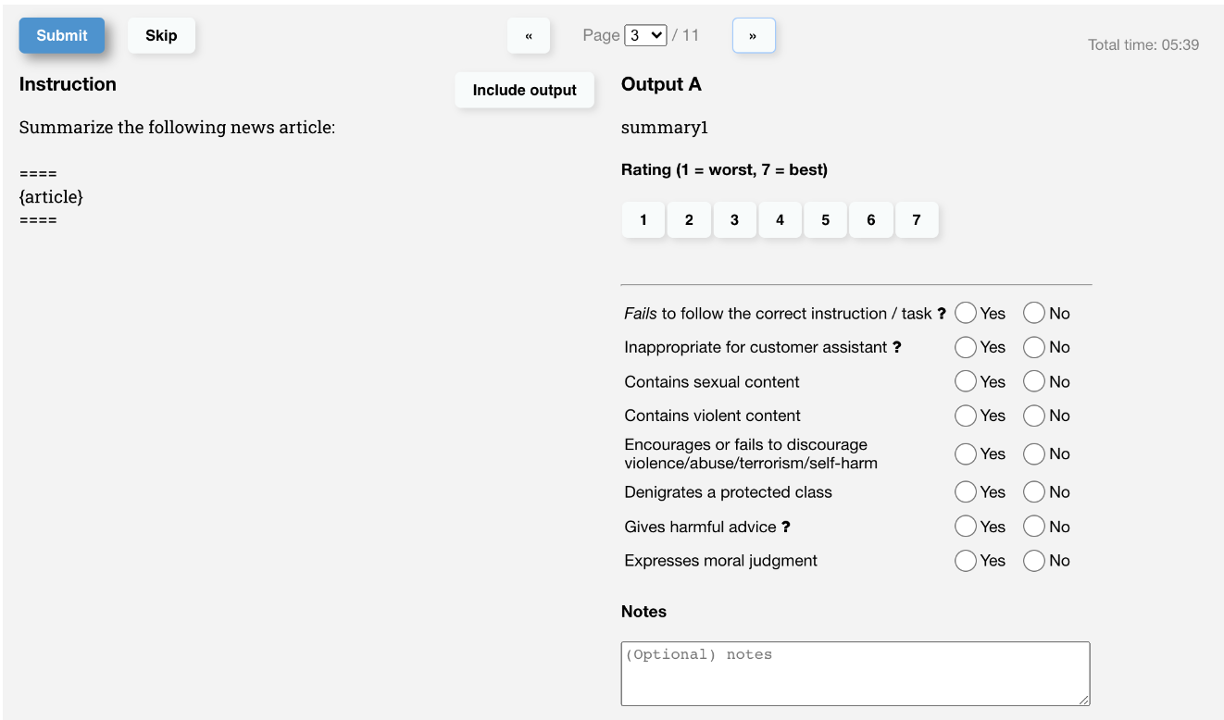AI Competitions and Benchmarks: Dataset Development
2404.09703

0
0

Abstract
Machine learning is now used in many applications thanks to its ability to predict, generate, or discover patterns from large quantities of data. However, the process of collecting and transforming data for practical use is intricate. Even in today's digital era, where substantial data is generated daily, it is uncommon for it to be readily usable; most often, it necessitates meticulous manual data preparation. The haste in developing new models can frequently result in various shortcomings, potentially posing risks when deployed in real-world scenarios (eg social discrimination, critical failures), leading to the failure or substantial escalation of costs in AI-based projects. This chapter provides a comprehensive overview of established methodological tools, enriched by our practical experience, in the development of datasets for machine learning. Initially, we develop the tasks involved in dataset development and offer insights into their effective management (including requirements, design, implementation, evaluation, distribution, and maintenance). Then, we provide more details about the implementation process which includes data collection, transformation, and quality evaluation. Finally, we address practical considerations regarding dataset distribution and maintenance.
Create account to get full access
Overview
- This paper discusses the development of datasets for AI competitions and benchmarks, which are crucial for advancing the field of artificial intelligence.
- The authors cover key aspects of dataset development, including documentation, data collection, and dataset assessment.
- The paper provides insights and best practices for researchers and practitioners involved in creating high-quality datasets to support AI progress.
Plain English Explanation
Understanding the Dataset Practitioners Behind Large Language Models is a comprehensive look at the importance of dataset development for AI competitions and benchmarks. Datasets serve as the foundation for training and evaluating AI systems, and their quality directly impacts the capabilities and performance of these models.
The paper emphasizes the need for thorough documentation, which helps ensure that datasets are well-understood, reproducible, and can be used effectively by the broader research community. Data Readiness: A 360-Degree Survey covers the various aspects of data readiness, such as data quality, governance, and infrastructure, that are crucial for developing high-quality datasets.
Fair Enough: How Can We Develop and Assess Fair AI Systems? delves into the importance of fairness in dataset development, as biases in the data can lead to unfair and discriminatory AI systems. The authors discuss approaches for mitigating these issues and ensuring that datasets are representative and inclusive.
The paper also examines Revealing Trends in Datasets from the 2022 ACL and EMNLP, which provides insights into the latest developments and trends in the dataset landscape for natural language processing tasks. This information can help guide researchers and practitioners in their dataset creation efforts.
Additionally, the paper covers Best Practices and Lessons Learned for Synthetic Data in Language, which explores the use of synthetic data to augment or replace real-world data in certain scenarios. This can be particularly useful when real-world data is scarce or difficult to obtain.
Overall, this paper offers a comprehensive and practical guide for researchers and practitioners involved in the development of high-quality datasets to support the advancement of AI technologies and their responsible deployment.
Technical Explanation
The paper provides a detailed exploration of the key aspects of dataset development for AI competitions and benchmarks. It starts by emphasizing the importance of thorough documentation, which enables datasets to be well-understood, reproducible, and effectively utilized by the broader research community.
The authors delve into the various facets of data readiness, including data quality, governance, and infrastructure, which are critical considerations for creating high-quality datasets. They highlight the need to address fairness and mitigate biases in datasets, as these can lead to unfair and discriminatory AI systems.
The paper also examines the latest trends and developments in datasets used for natural language processing tasks, drawing insights from the 2022 ACL and EMNLP conferences. This information can guide researchers and practitioners in their dataset creation efforts, ensuring that their work aligns with the evolving landscape of the field.
Furthermore, the paper covers the use of synthetic data to augment or replace real-world data in certain scenarios. This can be particularly useful when real-world data is scarce or difficult to obtain, such as in sensitive or high-risk domains. The authors discuss best practices and lessons learned from the use of synthetic data in language-related tasks.
Throughout the paper, the authors provide a comprehensive and practical guide for researchers and practitioners involved in the development of high-quality datasets to support the advancement of AI technologies and their responsible deployment.
Critical Analysis
The paper provides a thorough and well-researched overview of the key considerations and best practices in dataset development for AI competitions and benchmarks. The authors have clearly put significant effort into synthesizing insights from various relevant studies and initiatives, making this paper a valuable resource for the AI research community.
One potential limitation of the paper is its broad scope, which may limit the depth of coverage for certain specific topics. For instance, while the section on fairness and bias mitigation is important, the authors could have provided more detailed guidance or case studies on effective strategies for addressing these issues.
Additionally, the paper does not delve deeply into the potential challenges and trade-offs involved in dataset development, such as the difficulties in obtaining representative and diverse data, or the resource constraints that researchers may face. Exploring these challenges and discussing potential solutions could further strengthen the paper's utility for practitioners.
Revealing Trends in Datasets from the 2022 ACL and EMNLP provides valuable insights into the latest developments in the dataset landscape, but the authors could have discussed the potential implications of these trends and how they might shape the future of AI research and applications.
Overall, the paper is a comprehensive and insightful resource that effectively highlights the critical role of dataset development in advancing AI capabilities and their responsible deployment. Readers are encouraged to think critically about the research and form their own opinions, while also considering the potential areas for further exploration and refinement.
Conclusion
This paper offers a detailed and practical guide for researchers and practitioners involved in the development of high-quality datasets to support the advancement of AI technologies. It emphasizes the importance of thorough documentation, data readiness, fairness, and the use of synthetic data to augment or replace real-world data.
By providing insights from various relevant studies and initiatives, the authors have created a valuable resource that can help the AI research community navigate the complex landscape of dataset development. The paper's comprehensive coverage of key topics, coupled with the authors' attention to best practices and lessons learned, makes it a valuable reference for anyone working to create datasets that enable the progress and responsible deployment of AI systems.
This summary was produced with help from an AI and may contain inaccuracies - check out the links to read the original source documents!
Related Papers

Understanding the Dataset Practitioners Behind Large Language Model Development
Crystal Qian, Emily Reif, Minsuk Kahng

0
0
As large language models (LLMs) become more advanced and impactful, it is increasingly important to scrutinize the data that they rely upon and produce. What is it to be a dataset practitioner doing this work? We approach this in two parts: first, we define the role of dataset practitioners by performing a retrospective analysis on the responsibilities of teams contributing to LLM development at a technology company, Google. Then, we conduct semi-structured interviews with a cross-section of these practitioners (N=10). We find that although data quality is a top priority, there is little consensus around what data quality is and how to evaluate it. Consequently, practitioners either rely on their own intuition or write custom code to evaluate their data. We discuss potential reasons for this phenomenon and opportunities for alignment.
4/3/2024

Data Quality in Edge Machine Learning: A State-of-the-Art Survey
Mohammed Djameleddine Belgoumri, Mohamed Reda Bouadjenek, Sunil Aryal, Hakim Hacid

0
0
Data-driven Artificial Intelligence (AI) systems trained using Machine Learning (ML) are shaping an ever-increasing (in size and importance) portion of our lives, including, but not limited to, recommendation systems, autonomous driving technologies, healthcare diagnostics, financial services, and personalized marketing. On the one hand, the outsized influence of these systems imposes a high standard of quality, particularly in the data used to train them. On the other hand, establishing and maintaining standards of Data Quality (DQ) becomes more challenging due to the proliferation of Edge Computing and Internet of Things devices, along with their increasing adoption for training and deploying ML models. The nature of the edge environment -- characterized by limited resources, decentralized data storage, and processing -- exacerbates data-related issues, making them more frequent, severe, and difficult to detect and mitigate. From these observations, it follows that DQ research for edge ML is a critical and urgent exploration track for the safety and robust usefulness of present and future AI systems. Despite this fact, DQ research for edge ML is still in its infancy. The literature on this subject remains fragmented and scattered across different research communities, with no comprehensive survey to date. Hence, this paper aims to fill this gap by providing a global view of the existing literature from multiple disciplines that can be grouped under the umbrella of DQ for edge ML. Specifically, we present a tentative definition of data quality in Edge computing, which we use to establish a set of DQ dimensions. We explore each dimension in detail, including existing solutions for mitigation.
6/6/2024

Machine Learning Data Practices through a Data Curation Lens: An Evaluation Framework
Eshta Bhardwaj, Harshit Gujral, Siyi Wu, Ciara Zogheib, Tegan Maharaj, Christoph Becker

0
0
Studies of dataset development in machine learning call for greater attention to the data practices that make model development possible and shape its outcomes. Many argue that the adoption of theory and practices from archives and data curation fields can support greater fairness, accountability, transparency, and more ethical machine learning. In response, this paper examines data practices in machine learning dataset development through the lens of data curation. We evaluate data practices in machine learning as data curation practices. To do so, we develop a framework for evaluating machine learning datasets using data curation concepts and principles through a rubric. Through a mixed-methods analysis of evaluation results for 25 ML datasets, we study the feasibility of data curation principles to be adopted for machine learning data work in practice and explore how data curation is currently performed. We find that researchers in machine learning, which often emphasizes model development, struggle to apply standard data curation principles. Our findings illustrate difficulties at the intersection of these fields, such as evaluating dimensions that have shared terms in both fields but non-shared meanings, a high degree of interpretative flexibility in adapting concepts without prescriptive restrictions, obstacles in limiting the depth of data curation expertise needed to apply the rubric, and challenges in scoping the extent of documentation dataset creators are responsible for. We propose ways to address these challenges and develop an overall framework for evaluation that outlines how data curation concepts and methods can inform machine learning data practices.
5/7/2024

Position: Insights from Survey Methodology can Improve Training Data
Stephanie Eckman, Barbara Plank, Frauke Kreuter

0
0
Whether future AI models are fair, trustworthy, and aligned with the public's interests rests in part on our ability to collect accurate data about what we want the models to do. However, collecting high-quality data is difficult, and few AI/ML researchers are trained in data collection methods. Recent research in data-centric AI has show that higher quality training data leads to better performing models, making this the right moment to introduce AI/ML researchers to the field of survey methodology, the science of data collection. We summarize insights from the survey methodology literature and discuss how they can improve the quality of training and feedback data. We also suggest collaborative research ideas into how biases in data collection can be mitigated, making models more accurate and human-centric.
6/11/2024